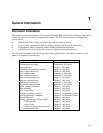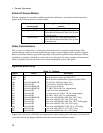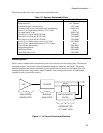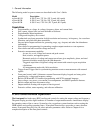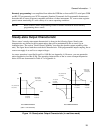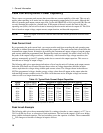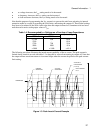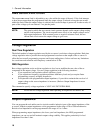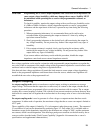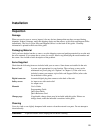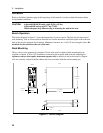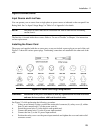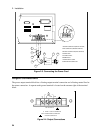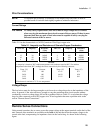
1 - General Information
18
RMS Current Limit Circuit
The output rms current limit is adjustable to any value within the range of the unit. If the load attempts
to draw more current than the programmed limit, the output voltage is reduced to keep the rms current
within the limit. When the output voltage is reduced, the waveform shape is preserved. In other words, all
parts of the voltage cycle are reduced -- not just the peaks.
NOTE: The speed at which the rms current circuit operates depends on the output voltage setting
and the load impedance. The circuit responds more slowly at low output voltages and at
high output impedances. With constant power or negative resistance loads, the rms
current limit circuit causes the output voltage to go to zero.
Voltage Regulation
Real Time Regulation
The default method of output regulation used by the ac source is real-time voltage regulation. Real-time
voltage regulation tries to provide the actual programmed waveform at the output of the ac source. It
offers the best overall programming response and fastest settling times. It does not have any limitations
for waveforms and transients with frequency content below 45 Hz.
RMS Regulation
Rms voltage regulation assists real-time regulation to level out or stabilize the rms value of the ac
component of the output voltage. Use rms voltage regulation in the following situations:
♦ If you experience load regulation effects with heavy loads.
♦ If you experience frequency regulation problems with heavy loads and you require flatter
programming accuracy at higher frequencies.
♦ In conjunction with programmable output impedance, if you wish to maintain the rms level of
output voltage as the source impedance is increases. (Refer to Output Impedance for more
information.)
The command to specify voltage regulation is VOLT:ALC:DET RTIM | RMS.
NOTE: Do not use rms voltage regulation when operating at frequencies less than 45 Hz.
Output Impedance
You can program the real and/or reactive (resistive and/or inductive) part of the output impedance of the
ac source. Inductive output impedances can be programmed in the range of 20 to 1000 microhenries.
Resistive load impedances can be programmed in the range of 0 to 1 ohms.
When programming output impedances, the lower your load impedance, the LESS programmed
impedance you can use and still maintain output voltage stability. This applies particularly for load
impedances less than 1 ohm.




